

ACTIVITIES REPORT
 Partners' Institution:
Partners' Institution:CPR Gijón
 Project's period (from/to):
Project's period (from/to):November 2007 - September 2009
 WP concerned:
WP concerned:WP 6 - Experimentation and evaluation of the portal
 Objectives of activities carried out:
Objectives of activities carried out:1. To call a seminar to involve language teachers in the pilot of the ELS portal as an official in-service training activity in our institution.
2. To collect their feedback on the Contents, Usability of the online platform (ease of navigation, clarity), etc.
3. To select one native online tutor, Marián González Barriuso, who will be in charge of the on-line tutoring.
4. To contribute to the second transnational meeting held in Rome with the conclusions reached by the 13 teachers involved in the seminar.
5. To call a seminar to involve 40 language teachers in the piloting of the ELS portal as an official in-service training activity in Asturias. This seminar will be held from November 2008 untill March/April 09.
6. To foster the participation of both teachers and students in the different topics presented by the tutors in the different fora, in the different languages.
7. To provide partners a draft version of an evaluation questionnaire to reach a final version to be used by all the project members.
8. To use the evaluation questionnaire with the teachers in charge of testing and evaluationg the ELS platform.
9. To collect at least 30 evaluation questionnaires from the teachers who used the ELS platform.
2. To collect their feedback on the Contents, Usability of the online platform (ease of navigation, clarity), etc.
3. To select one native online tutor, Marián González Barriuso, who will be in charge of the on-line tutoring.
4. To contribute to the second transnational meeting held in Rome with the conclusions reached by the 13 teachers involved in the seminar.
5. To call a seminar to involve 40 language teachers in the piloting of the ELS portal as an official in-service training activity in Asturias. This seminar will be held from November 2008 untill March/April 09.
6. To foster the participation of both teachers and students in the different topics presented by the tutors in the different fora, in the different languages.
7. To provide partners a draft version of an evaluation questionnaire to reach a final version to be used by all the project members.
8. To use the evaluation questionnaire with the teachers in charge of testing and evaluationg the ELS platform.
9. To collect at least 30 evaluation questionnaires from the teachers who used the ELS platform.
 Description of activities carried out:
Description of activities carried out:1. Four Meetings with the 13 language teachers involved in piloting the contents available of the ELS portal with the purpose of collecting their feedback on the Contents, Usability of the online platform (ease of navigation, clarity), etc.
2. Presentation of the ELS portal to the two work groups.
3. Distribution of work to be done.
4. Gathering evaluation grids and analysing results of the ELS portal piloting by 13 language teachers.
5. Two Meetings with the two work groups of Asturian teachers to get the final conclusions after the provisional piloting.
6. Inclusion of these conclusions and results in the documentation presented in the second transnational meeting held in Rome.
7. The seminar call has resulted in the organisation and development of three workshops up to this point, there are 32 teachers registered in the platform, and about 20 of them are already working with their students through the platform, mainly in the English course, but also in French.
8. These students are participating actively in the fora provided by the portal.
9. Teachers are still finding some content or thechnical bugs in the portal that are reported to Pixel to be satisfactorily mended.
10. Teachers have been provided with the final version of the evaluation questionnaire to be discussed in the next workshop in April.
11. 31 teachers have already presented their filled-in evaluation questionnaires which will be the tool for elaborating the national evaluation report.
12. The data provided by the teachers has been processed and turned into graphs in an excel file.
13. An evaluation report on the experimentation of the portal has been written and sent to Pixel.
2. Presentation of the ELS portal to the two work groups.
3. Distribution of work to be done.
4. Gathering evaluation grids and analysing results of the ELS portal piloting by 13 language teachers.
5. Two Meetings with the two work groups of Asturian teachers to get the final conclusions after the provisional piloting.
6. Inclusion of these conclusions and results in the documentation presented in the second transnational meeting held in Rome.
7. The seminar call has resulted in the organisation and development of three workshops up to this point, there are 32 teachers registered in the platform, and about 20 of them are already working with their students through the platform, mainly in the English course, but also in French.
8. These students are participating actively in the fora provided by the portal.
9. Teachers are still finding some content or thechnical bugs in the portal that are reported to Pixel to be satisfactorily mended.
10. Teachers have been provided with the final version of the evaluation questionnaire to be discussed in the next workshop in April.
11. 31 teachers have already presented their filled-in evaluation questionnaires which will be the tool for elaborating the national evaluation report.
12. The data provided by the teachers has been processed and turned into graphs in an excel file.
13. An evaluation report on the experimentation of the portal has been written and sent to Pixel.
 Outcomes:
Outcomes:1. Meetings with language teachers and advisors in Asturias to involve them in the ELS@Work project tasks.
2. Report describing the findings of the Work groups’ piloting of the ELS portal.
3. A ppt including these findings to contribute to the second transnational meeting in Rome.
4. Thirteen teachers are now interested in participating in the "official" piloting as they know the portal will be improved from both the technical and the contents point of view.
5. Three worksops with 32 teachers who are now experimenting with the portal.
6. 31 teachers have individually evaluated the portal after working with 241 students.
7. An evaluation report on the experimentation of the portal in Asturias has been produced.
2. Report describing the findings of the Work groups’ piloting of the ELS portal.
3. A ppt including these findings to contribute to the second transnational meeting in Rome.
4. Thirteen teachers are now interested in participating in the "official" piloting as they know the portal will be improved from both the technical and the contents point of view.
5. Three worksops with 32 teachers who are now experimenting with the portal.
6. 31 teachers have individually evaluated the portal after working with 241 students.
7. An evaluation report on the experimentation of the portal in Asturias has been produced.
 Evaluation of the work undertaken:
Evaluation of the work undertaken:Especially interesting are the findings exposed in the Report on the provisional pilot of the ELS portal by the 13 language teachers mentioned above. The main conclusions of the report should be taken into account in the design of the on-line tutoring of the ELS portal.
Now that the contents of the platform have been improved it will be very interesting to see if there are any changes between the findings of the provisional piloting that finished in September 2008 and those of the official piloting to start in November 2008.
These 13 teachers involved in the seminar for the provisional piloting can also be considered as a dissemination source in themselves.
From a quantitative viewpoint, the work plan has not been satisfactorily met as we still need to involve at least 8 more teachers to experiment and evaluate the portal. That's the reason why another seminar call has been presented in March 2009 in order to involve more teachers. The workshops will be starting in April and finishing in September.
On the other hand, from a content viewpoint, the job done by this institution with the organisation and development of the workshops, involvement of teachers, participation of students in the fora, etc, is regarded as very positive.
All the objectives and activities in this WP have been satisfactorily met by this institution as we have finally involved 41 schoolteachers and collected 30 evaluation questionnaires from them in order to analyse all the data provided.
The evaluation report has finally concluded that the portal was considered to be very useful. We would like to highlight the following aspects:
• Students showed positive perception of this platform.
• It made the language classes more dynamic and interesting.
• Students were more curious and motivated as the ELS platform offered a different challenge.
• It promoted learner autonomy and continuous learning.
• It ensured cooperative learning and different interactions: student-student, teacher-student, student-computer interaction, etc.
• It personalized the learning process, especially useful in mixed-ability classes, they learned at their own pace.
• It familiarized learners with the target language culture offering real contexts, authentic materials and varied topics.
• It raised cultural awareness in order to educate multilingual and multicultural students.
Now that the contents of the platform have been improved it will be very interesting to see if there are any changes between the findings of the provisional piloting that finished in September 2008 and those of the official piloting to start in November 2008.
These 13 teachers involved in the seminar for the provisional piloting can also be considered as a dissemination source in themselves.
From a quantitative viewpoint, the work plan has not been satisfactorily met as we still need to involve at least 8 more teachers to experiment and evaluate the portal. That's the reason why another seminar call has been presented in March 2009 in order to involve more teachers. The workshops will be starting in April and finishing in September.
On the other hand, from a content viewpoint, the job done by this institution with the organisation and development of the workshops, involvement of teachers, participation of students in the fora, etc, is regarded as very positive.
All the objectives and activities in this WP have been satisfactorily met by this institution as we have finally involved 41 schoolteachers and collected 30 evaluation questionnaires from them in order to analyse all the data provided.
The evaluation report has finally concluded that the portal was considered to be very useful. We would like to highlight the following aspects:
• Students showed positive perception of this platform.
• It made the language classes more dynamic and interesting.
• Students were more curious and motivated as the ELS platform offered a different challenge.
• It promoted learner autonomy and continuous learning.
• It ensured cooperative learning and different interactions: student-student, teacher-student, student-computer interaction, etc.
• It personalized the learning process, especially useful in mixed-ability classes, they learned at their own pace.
• It familiarized learners with the target language culture offering real contexts, authentic materials and varied topics.
• It raised cultural awareness in order to educate multilingual and multicultural students.